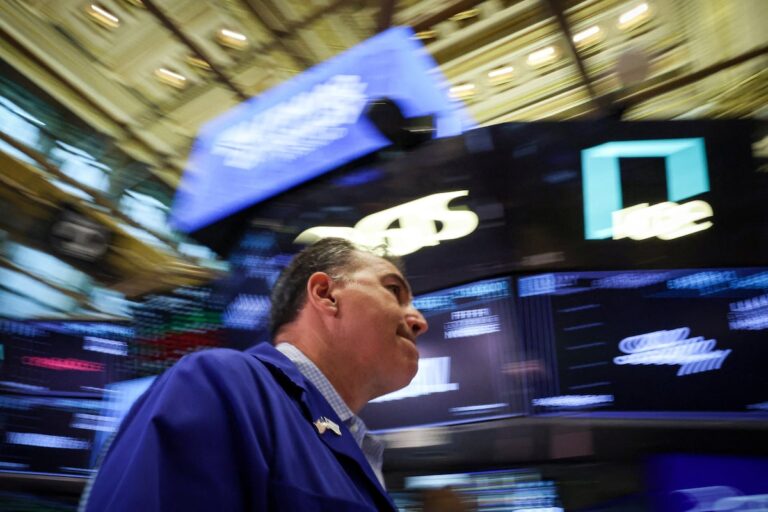Canada’s main stock index opened at a record high on Wednesday, lifted by growing expectations for a September U.S. Federal Reserve interest rate cut.
At 9:31 a.m. ET, the Toronto Stock Exchange’s S&P/TSX composite index (TXCX) was up 0.31 per cent at 28,007.64 points.
Wall Street’s main indexes opened higher on Wednesday with the benchmark S&P 500 and the Nasdaq hitting record highs, underpinned by growing optimism that the Federal Reserve could restart its monetary policy easing cycle next month.
The Dow Jones Industrial Average rose 112.9 points, or 0.25 per cent, at the open to 44571.53. The S&P 500 rose 16.9 points, or 0.26 per cent, to 6462.67, while the Nasdaq Composite rose 82.6 points, or 0.38 per cent, to 21764.548.
Signs that U.S. taxes on imports have not fully filtered into headline consumer prices sparked a relief rally on Wall Street in the previous session, with the benchmark S&P 500 marking its first record high close in two weeks.
Despite core inflation marking its biggest jump since the start of the year, investors factored in recent weakness in the job market and a shake-up at the Federal Reserve as they leaned in favour of a potential dovish move by the central bank in September.
Interest rate futures now reflect a 97.3-per-cent chance of a 25 basis points interest rate cut, according to data compiled by LSEG, compared with 88.8 per cent on Tuesday. The central bank last lowered borrowing costs in December.
“A benign CPI report, coming on the heels of weak non-farm payrolls, has strengthened the case for a September Fed cut,” said Nikos Tzabouras, senior market analyst at Tradu.com.
“However, market euphoria could be challenged as stagflation risks persist, potentially eroding consumption and hurting advertising – a key revenue stream for many tech giants.”
The CBOE volatility index, popularly referred to as Wall Street’s fear gauge, dropped to 14.46 – its lowest since January.
Rate-sensitive banking stocks such as Bank of America and Citigroup were marginally higher in early trading after the broader sector logged its biggest daily rise in three months on Tuesday.
Analysts said a steepening yield curve following the inflation report could help bank earnings as lenders could borrow cheap and lend at a higher rate.
Later in the day, investors will scrutinize remarks of a number of policymakers, especially Chicago Fed President Austan Goolsbee – a Federal Open Market Committee voting member this year.
Earnings are also in focus. CoreWeave, which is backed by Nvidia, lost 11.6 per cent after the AI data centre operator reported a bigger-than-expected quarterly net loss.
Eyes are also on developments surrounding the China revenue-sharing deal the U.S. government signed with chipmakers like Nvidia and Advanced Micro Devices, which the White House said could be expanded to others in the sector.
Crude prices traded around $60 per barrel ahead of a virtual meeting between Donald Trump and European leaders on the Russo-Ukraine conflict, two days before the U.S. president meets Russian President Vladimir Putin.
Global share markets hit a record and the dollar was subdued on Wednesday, as investors cheered mild inflation data and signs of resilience in major economies, and expectations of a U.S. rate buoyed demand for riskier assets.
The MSCI All Country World Index of shares climbed for a second day and reached 950.13, an all-time high. Japan’s Nikkei stock index, meanwhile, set a fresh peak for a second-straight session.
European stocks advanced 0.5 per cent, with German shares adding 0.6 per cent. Tech and defense stocks led the gains.
In Japan, a Reuters poll that tracks the Bank of Japan’s quarterly tankan business survey showed the Japanese manufacturers’ sentiment index improved for a second straight month.
Another report showed Japan’s wholesale inflation slowed in July, underscoring the central bank’s view that upward price pressure from raw material costs will ease.
The Nikkei rose for the sixth straight day, breaking the 43,000 level for the first time and hitting a fresh record high.
Risk-sensitive cryptocurrency ether rose to an almost four-year high above $4,679.
The dollar index, which tracks the greenback against a basket of major peers, fell for a second day. It was last down 0.2 per cent at 97.80
The dollar fell 0.2 per cent against the yen to 147.47. The euro added 0.3 per cent to $1.1706, after a 0.5 per cent jump in the previous session.
Investors had been on tenterhooks about the inflation data because it followed a surprisingly weak jobs report on August 1 and had the potential to stoke concerns about stagflation – when an economy suffers both high inflation and high unemployment.
Trump has nominated White House adviser Stephen Miran to temporarily fill a vacant board seat at the U.S. central bank, stirring up speculation about presidential interference in monetary policy.
And the White House said it was “the plan” that the Bureau of Labor Statistics would continue to publish its closely watched monthly employment report after Trump’s pick to head the agency, E.J. Antoni, proposed suspending its release.
Speculation the labour report would be halted has “done the USD no favors and would have only incentivized foreign investors to review their hedging ratios on U.S. investments,” Chris Weston, head of research at Pepperstone, said in a note.
In sovereign bond markets, German 30-year bond yields fell on Wednesday, retreating from the previous day’s 14-year high.
U.S. crude fell 0.2 per cent to $62.99 a barrel.
Reuters
